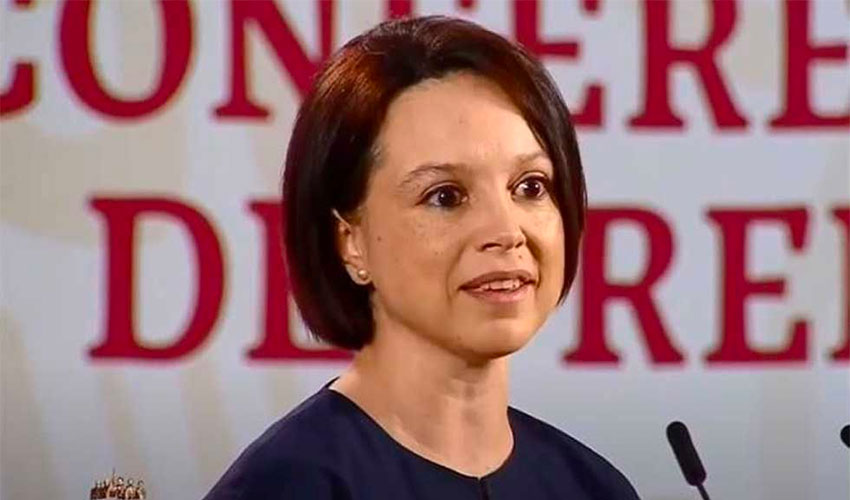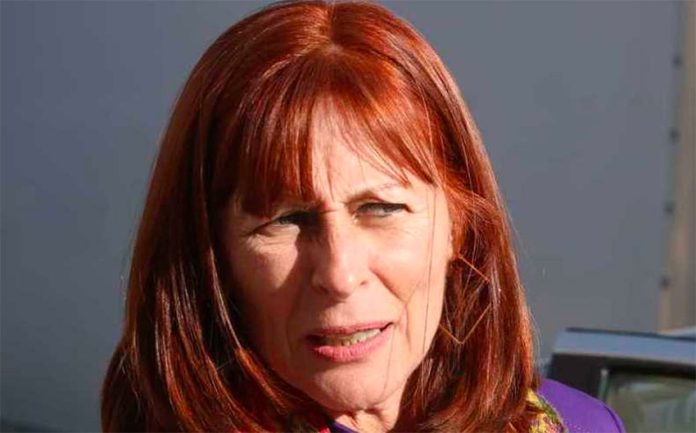President López Obrador on Monday appointed his 2018 campaign chief Tatiana Clouthier as his new economy minister, asserting that she will help boost economic growth and maintain good relations with the business sector and unions.
Graciela Márquez, who had been economy minister since the current government took office in December 2018, will move to the board of the national statistics agency Inegi, López Obrador said.
The president said that Clouthier, who left her position as a ruling party lawmaker in the lower house of Congress to join the federal cabinet, is “a woman with principles, integrity and honesty.”
“She will help us to continue promoting economic activity in the country and … [maintain] good relations with the business sector and the labor sector. She’ll [also] continue promoting foreign trade,” López Obrador said, explaining they were the reasons he appointed her.
The daughter of the 1988 presidential candidate for the conservative, business-friendly National Action Party (PAN), Manuel Clouthier, the 56-year-old new economy minister is a strong communicator and could act as a vital link to the private sector as the government seeks to reinvigorate an economy that has been hit hard by the coronavirus pandemic and looks set to record its worst annual contraction since the Great Depression.
Her appointment came just five days after López Obrador announced that chief of staff Alfonso Romo, who served as a key interlocutor with the business sector, was stepping down.
Clouthier, a Sinaloa native who has lived in Monterrey, Nuevo León, for many years, has longstanding relationships within the private sector that she cultivated herself as well as through her father – who died in a car accident a year after he ran for president – and her husband, a businessman.
She served as a federal deputy for the PAN between 2003 and 2005 but left that party in the latter year to sit as an independent. In 2009 she ran unsuccessfully for mayor of San Pedro Garza García, an affluent municipality in the Monterrey metropolitan area.
Clouthier subsequently worked at a Monterrey university owned by Alfonso Romo before returning to politics with López Obrador’s Morena party, running a campaign that culminated in a landslide victory at the 2018 election.
Her appointment as economy minister was welcomed by several business groups.
Nuevo León industry association Caintra said in a statement that Clouthier knows the “industrial agenda” of the northern state and the concerns of its businesses firsthand.

The Business Coordinating Council, an umbrella organization of 12 business groups, said the new economy minister will find a “willingness” for dialogue in the private sector as well as proposals to aid the economic recovery.
The Confederation of Industrial Chambers said it was confident it would establish a close relationship with Clouthier, saying that there is a “plentiful and promising” common agenda.
Márquez, an academic and economist who had no experience in politics when she joined López Obrador’s cabinet, said she was satisfied with her work as economy minister and cited the implementation of the United States-Mexico-Canada Agreement (USMCA) as a key achievement.
“The USMCA is implemented, we finished [the negotiations] and created all the regulations … for the treaty,” Márquez said.
López Obrador also announced Monday that he was nominating Galia Borja, currently treasurer of the federation, to be a deputy governor of the central bank. Elvira Concheiro, a researcher, will become treasurer, he said.
The president said the changes have nothing to do with a “gender quota” but instead are related to “the need to have men and women characterized by honesty in the public service.”
Eduardo Osuna, general director of the bank BBVA México, praised Borja’s appointment to the central bank deputy governor role.
“I think that it’s an appointment that points in the right direction [in terms of] the autonomy of the Bank of México,” he said, adding that she has the appropriate academic background to understand the bank’s challenges.
BBVA chief economist Carlos Serrano noted that it’s not the first time that a treasurer has moved into a deputy governor role at the central bank. “We saw it with Irene Espinosa,” he said.
Espinosa, treasurer during the governments led by former presidents Felipe Calderón and Enrique Peña Nieto, is currently one of four deputy governors serving under Bank of México Governor Alejandro Díaz de León.
Source: Milenio (sp), El Financiero (sp)
